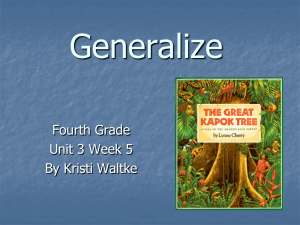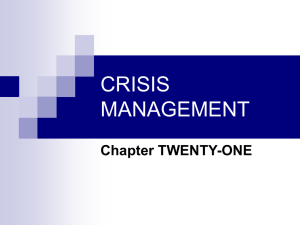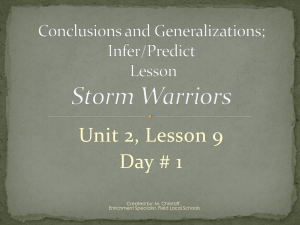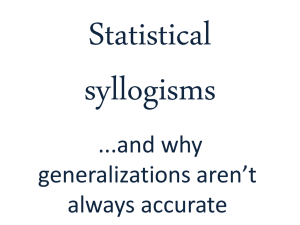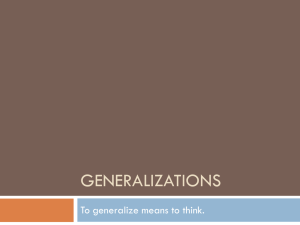Making Generalizations
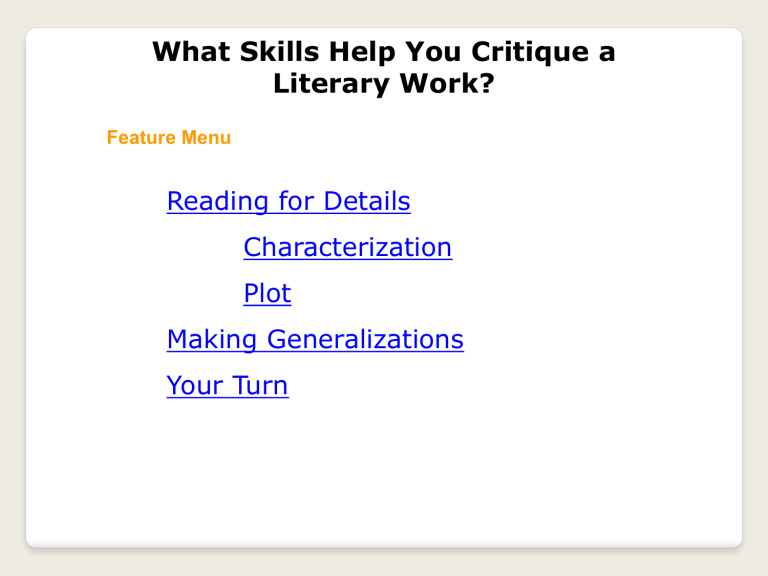
What Skills Help You Critique a
Literary Work?
Feature Menu
Learning Objective:
We will critique the credibility of characterization using details.
Teacher reads
Students read
P/s nv x2
Reading for Details
Sometimes the truth is in the details.
APK
The Language of Literary Criticism
Here are some of the words and phrases critics use when they critique characterization.
Words and Phrases Used to Describe Characters
Positive Negative original believable or credible or convincing well-rounded stereotyped unbelievable or not credible or unconvincing flat dynamic—refers to characters who change and grow static—refers to characters who remain the same
Teacher model: The evil step-mother in Snow White is a stereotyped character because….
Students talk to you partner about another character from a story or movie who is stereotypical.
Reading for Details
When you read fiction, it’s important to
• read the whole work carefully
• pay attention to key details
Reading for Details: Characterization
As you read, look for details related to characters’ qualities thoughts words actions
These will help us decide if a character is credible (or believable)
Reading for Details: Characterization
Reading for details will help you critique the credibility of characters in a story.
For example, you probably wouldn’t believe in an acrobat who
• was terribly afraid of heights
OR Is it a swing— or a trapeze?
• used the wrong terms to describe his work
What are the kinds details about a character that we look for when critiquing their credibility? p/s, nv x2
Reading for Details: Characterization
Ask yourself these questions:
• Do these details make the characters seem believable?
• Has the writer provided enough details to bring the characters to life on the page?
• Or do the characters seem like flat cardboard figures?
Which is an example of a detail that would help us critique the credibility of a character who is a scientist?
A. He drives his car to work.
B. He uses the correct scientific terminology when talking about experiments. wb
How do you know?
Ps/ nv x2
Importance
Why is it important to be able to critique the credibility of characters?
•You will have to be able to decide if characters are credible when reading.
•It will help you make better choices as a consumer.
•It will help you when you analyze what you read in high school.
Now turn to your partner and tell them which reason is most important to you. You can use on of my reasons or one of your own.
p/s - volunteers
Making Generalizations
Making generalizations as you read can help you critique a story’s credibility. Ask yourself
What conclusions can I draw about people or life based on the story?
When we look for details to critique characters’ credibility we use them to make generalizations.
A generalization is a conclusion drawn from several examples or pieces of evidence.
Evidence Evidence Generalization
Whenever you volunteer at the homeless shelter, you get a good feeling inside.
+
Your neighbor contributes to many charities, and she always seems happy.
=
Helping other people makes us feel happy and good about ourselves.
What is a generalization? P/S nv x2
What Skills Help You Critique a Literary Work?
Quick Check
Difficult challenges can become easy when you have friends to support you.
Jamal blushes when her music teacher praises her violin playing.
Match each example with the correct term.
detail generalization
In your own words, how did you know?
PS/nv x2
Why do we need to be able to assess the credibility of characters?
Helps you make informed decisions
Decide if information source is reliable
Improve your reading comprehension
Turn to your partner and discuss why you think it is important to identify credibility in characters.
You can use a reason of your own or one of my reasons.
PS Volunteers
Making Generalizations to Critique
Credibility
To make a generalization about a character
1. take evidence from the text
2. combine it with what you already know
3. come up with a broad statement that illustrates a truth about what you’ve read
4. Test your generalization for credibility by comparing it to further details from the text.
Making Generalizations
Making a generalization about a character.
I do:
Evidence in text
My
Knowledge
Ebenezer
Scrooge is very stingy, and he has no friends.
+
The way we treat others usually determines whether we have friends.
Generalization
=
People who do not share with others will not have many friends.
How did I make my generalization? Ps, nv x2
Making Generalizations
Your generalization can help you test whether the characters and plot are believable or realistic.
I do:
Generalization
Do all the details fit?
People who do not share with others will not have many friends.
Yes. None of the details in the story contradict, or go against, this idea.
How did I decide if my generalization was credible? Ps/ nv x2
Guided Practice
Making Generalizations
Making a generalization about a character.
All Summer in a Day page 30 (last paragraph)
We do:
Evidence in text
My
Knowledge Generalization
+ =
How did we make our generalization? Ps, nv x2
Guided Practice
Making Generalizations
Your generalization can help you test whether the characters and plot are believable or realistic.
I do:
Generalization
Do all the details fit?
How did we decide if our generalization was credible? Ps/ nv x2
Guided Practice
Making Generalizations
Making a generalization about a character.
We/you do:
Evidence in text
My
Knowledge Generalization
+ =
How did we make our generalization? Ps, nv x2
Guided Practice
Making Generalizations
Your generalization can help you test whether the characters and plot are believable or realistic.
We/you do:
Generalization
Do all the details fit?
How did we decide if our generalization was credible? Ps/ nv x2
Closure:
What do we look for, in the text, to help us critique a character’s credibility? wb
What is a conclusion drawn from several examples or pieces of evidence?
Wb
What is something you learned today about critiquing a character’s credibility?
Closure: Skill
What Skills Help You Critique a Literary Work?
Quick Check
Which of the following events in a story would
not support this generalization: “The only way to fix a mistake is to take responsibility for it”?
A teenage boy named Paul steals a woman’s purse on a dare from his friends.
A
Paul pretends to find the purse, returns it, and collects a reward.
Everyone is happy.
B
Paul’s feelings of guilt keep him awake at night. He starts to fail his classes.
C
[End of Section]
Independent Practice
Your Turn
1. Re-read a passage in a favorite short story or novel that contains important information about a character or the plot. Identify details that make the character or the plot event seem credible or realistic.
2. Make a generalization about people or life based on your knowledge and evidence from a movie you’ve seen. How does this generalization help you critique the credibility of the movie?
The End
